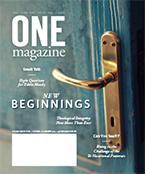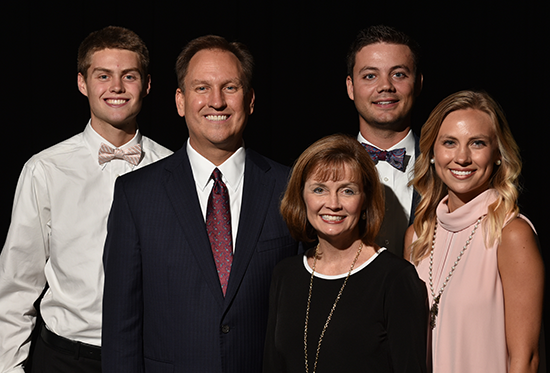
October-
November 2019
New Beginnings
------------------
|





Eight Questions for Eddie Moody
Interview by Eric K. Thomsen
Edward E. Moody, Jr., Ph.D. has pastored Tippett’s Chapel FWB Church in Clayton, North Carolina, since 2000. He additionally served as professor of counselor education and associate dean of the School of Education at North Carolina Central University since 1995. Prior to his confirmation, Dr. Moody was vice-chairman of the Welch College Board of Trustees and a member of the Denominational Research Committee.
The Licensed Professional Counselors Association of North Carolina named Moody Counselor of the Year in 2016. He holds a Ph.D. from North Carolina State University in counselor education, an M.A. from Middle Tennessee State University in clinical psychology, and a B.A. from Welch College in pastoral training.
He is author of Surviving Culture; First Aid for Emotional Hurts: Helping People Through Difficult Times; and the First Aid for Your Emotional Hurts training series, along with numerous professional journal and magazine articles. Eddie and his wife Lynne have two children, Mackenzie and Mitchell.
The ONE Magazine staff recently asked Eddie to share more about himself and his vision for the denomination.
What will people be most surprised to learn about you?
Many people might be surprised to learn I am ambidextrous, though I write more with my right hand. Another surprise may be that I grew up a North Carolina Tarheel fan. I remained a fan until I became a student and later an instructor at North Carolina State. Some of the athletes were my students, and I just couldn’t pull against them. Pretty soon I was pulling for the Wolfpack all the time.
Tell me briefly about your family (pictured below).
Lynne and I have been married 30 years. We have two children. Mackenzie is a graduate of Welch College and works for the Beaufort Linen Company while she completes her MBA. She and her husband Caleb minister at First FWB Church in Beaufort, North Carolina. Caleb is also a Welch graduate and is completing a master’s degree in school counseling. My son Mitchell is majoring in math and music education at Welch College this fall.

(Besides your parents) Who has had the most influence on your life?
The teachers at Bethel Christian Academy in Kinston, North Carolina, and the professors and staff of Welch College had the most influence. I suppose if I had to narrow it down to one person, though, it would be David Paramore. He served as pastor at Bethel FWB Church in Kinston for 28 years. I grew up at Bethel and experienced firsthand the revival when the church mushroomed in size.
I enjoyed the opportunity to learn at Bethel Christian Academy under godly teachers and staff, a school Paramore founded. At the church, I was able to explore my gifts. Pastor Paramore often had me do brief speeches at church as a teen, and I worked in children’s church. He influenced me toward Welch College.
For much of his ministry he was a bi-vocational pastor. He taught me how to visit someone in the hospital, saying often, “No one sick wants a long visit.” He taught me how to interact with people who might disagree with me politically. He truly showed me how to work with people. Growing up, I did not realize all I was learning from watching him.
You have been a pastor, educator, counselor, and denominational leader. How have you juggled all of your responsibilities?
First, I think time is our most valuable asset, so I try to live out Ephesians 5:16 daily, “redeeming the time.” Second, I really do enjoy what I do, and as a practice, I have used Psalm 37:4 as my guide. For example, during graduate school, I did career workshops with first semester freshmen. As I left class one day, I thought, “If God doesn’t want me to do this, why do I love it so much?”
At that time I was struggling about whether I was called to be a pastor or a professor. I felt the same way about teaching a group of teens at Immanuel FWB Church.
I began to sense God wanted me to do both. Rather than concluding it could not be done, I asked, “If God wants me to do this, how might it be done?” The result has been a major emphasis on time management. For example, I had a long commute to the university where I worked. Rather than being upset by traffic, I tried to concentrate on audio books and/or podcasts. There is no wasted time.
I also have learned how to combine things. For example, when supervising students who were counseling veterans, I was able to use much of what I learned when I counseled people at the church. Later, I would do Wednesday or Sunday evening Bible studies on what the Bible said about anxiety and trauma. Incidentally, much of that material later became books or booklets.
Besides your church, school, and extended family, what will you miss most about North Carolina?
I love all things North Carolina—the food, the weather, the outdoor trails and parks—but I may miss the libraries most of all. Even when we lived in Tennessee I traveled to the medical center library at Duke University to gain access to books and journals I needed. Since 1992, I have been able to use the triangle research library network which includes the libraries of the University of North Carolina at Chapel Hill, Duke, North Carolina State, and of course North Carolina Central University. In spare minutes before or after meetings, I am in those libraries several times a week. I will miss them.
How would you describe your leadership style?
When you go to the doctor with a complaint he or she usually runs a test. Sometimes, it is a blood test or a culture, but they assess the problem before they begin a treatment regimen. I try to assess a situation to learn as much as I can before jumping into action. Once I’ve assessed the issue, I try to convey what I have learned to those with whom I am working. I have done this at church as well as in the university. In both settings, you must bring people along. Those within the church often must be convinced. In a university setting, where many faculty members have tenure, they must see the need before one can proceed. I work with the individuals I lead to design a plan of action to address issues or problems. Then, as I confront an issue, I try to serve as a model in addressing it.
Briefly, what do you see as the future for Free Will Baptists?
Free Will Baptists are at a crossroads, along with every other evangelical denomination. Every denomination in the United States is in decline, and it is estimated eight out of every ten churches in the U.S. are declining or have plateaued. Even most growing churches are not keeping pace with the population growth of the nation.
The church no longer enjoys the “home field advantage” it once had in our increasingly post-Christian culture. In this environment, we must have healthy pastors and healthy churches capable of reaching an increasingly post-Christian, biblically-illiterate population. Pastors must prepare themselves by immersing in the Word and developing skills to help people understand how the gospel can free them from the entangling sin rampant today.
We need outward-focused churches that strive for unity by refusing to argue about preferences but remain doggedly focused on biblical principles. We must have churchmen and women who model the lifestyle described in Philippians 2, serving those they go to school and work with.
As you begin this new adventure as executive secretary, what would you like to say most to the denomination?
We are better together. The reasons for coming together and working together are perhaps even more valid today than they were in 1935. There is no comparison between what one church, or even a handful of churches, can do compared to what 2,100 churches can do together. Together, we can send far more missionaries, educate and equip ourselves, respond to disasters, and meet our own long-term needs more effectively than we could ever
do alone.
As our culture continues to deteriorate, a strong, theologically-sound denomination will be even more critical. I agree with Union University professor Nathan Finn who has noted it will become increasingly difficult to be a serious Christian in the American public square. He also indicates churches with “a thick sense of denominational identity are in the best position to provide the sort of catechesis and discipleship necessary to live faithfully in American Babylon.”
That’s what we intend to do. We may be small, but the parable of the talents teaches me that if we are faithful, we will have an impact and together hear “well done” when we come into the presence of our Savior.
|
|

